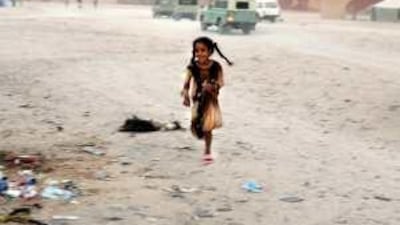RABAT // Two weeks ago six young Saharawis left their homes in Moroccan-controlled Western Sahara for a fortnight of debate in the UK with young Moroccans about the conflict dividing them, when they say they spotted police watching them in the airport at Agadir in southern Morocco. "At that moment I understood that Morocco was afraid of us going to Britain," said Nguia Haouasi, 19, a member of the group, heading for a dialogue workshop in Oxford.
The police stopped Ms el Haouasi and her companions from boarding their flight and later detained them, she said. Seven Moroccan students expected at the workshop also failed to board their flight from Casablanca on the same day in circumstances that remain unclear. For Ms el Haouasi, the alleged police action was intended to smother debate over the future of Western Sahara, a former Spanish colony largely annexed by Morocco in 1975.
The conflict pits Morocco against the Polisario Front, an Algerian-backed independence movement, severely stifling economic growth in North Africa and dividing hundreds of thousands of Saharawis between Western Sahara and bleak camps in the Algerian desert. Last Monday, Moroccan and Polisario diplomats met in Vienna to restart peace talks overseen by the United Nations. Ms el Haouasi and her friends sought similar space for debate abroad, because Moroccan law forbids questioning the country's rule in Western Sahara.
"I was looking forward to dialogue with our Moroccan brothers," said Mohammed-Fadel el Asri, 26, who led the group. "That can't take place in Morocco." Saharawis descend from Arab nomads who migrated from Yemen to North Africa in the 14th century and mingled with local Berber tribes, herding livestock, dabbling in commerce and plundering desert caravans. Spanish colonisers arrived in Western Sahara in the 19th century, attracted by fishing banks and later phosphates. When Spain withdrew in 1975, neighbouring Morocco and Mauritania invaded, claiming historical ties.
Polisario fighters repelled the Mauritanians, but Morocco has largely annexed Western Sahara and raised a 2,500km defensive berm down its length. The UN-brokered a ceasefire in 1991 meant to allow a referendum on independence, but disagreements over voter lists have prevented it. Today, Morocco proposes autonomy for Western Sahara, while Polisario still wants a referendum with independence as an option.
To Andrew Brown, director of the British non-profit group Talk Together, the stalemate is a prime occasion for bringing together young people from across the conflict. Delegations from Morocco, Western Sahara and the refugee camps were to converge amid the gables and red brick of St Edward's school, Oxford, for two weeks of conflict resolution training, exchanging viewpoints and getting to know one another, Mr Brown said.
However, plans swiftly went awry when the Western Sahara group were allegedly turned back from their flight. Meanwhile, the Moroccan embassy in London informed Mr Brown that all seven Moroccan participants had been grounded at the last minute by "family problems", he said. The Moroccan participants declined repeated requests for interview, transmitted via Talk Together. According to Mr Brown, the group said they were prevented from boarding their flight after checking in, but have not elaborated.
Both groups have said their passports and visas were in order. A Moroccan official expected at the workshop to present the Moroccan government's view has also not arrived, Mr Brown said. Jamal Chouaibi, an official at the Moroccan embassy in London who has helped co-ordinate the visits, declined to comment. Morocco's foreign ministry in Rabat did not respond to repeated requests for comment. At the airport in Agadir, Ms el Haouasi's group staged a sit-in and hunger strike near the ticket counters to protest against their being prevented from travelling, she said. "But the next day around 30 police of all kinds appeared."
"They beat us with their hands," said Mr el Asri. "Then they ejected us forcibly from the airport." According to Ms el Haouasi and Mr el Asri, police bundled the six Saharawis into a taxi and escorted them to Laayoune, Western Sahara, where they were questioned, beaten and released without being charged with a crime. Plainclothes police carrying truncheons clashed with the families of the six Saharawis, who greeted them waving Polisario flags and shouting pro-independence slogans, said Malak Amidan, 26, the sister of group member Mimouna Amidan.
The Saharawis' allegations were repeated in a statement by the UK-based human rights watchdog Amnesty International. Security officials in Agadir reached by telephone declined to comment, and security officials in Laayoune did not respond to repeated requests for comment. "These were not students, but activists sympathetic to Polisario," said Brahim Laghzal, a member of King Mohammed VI's advisory council on Saharan affairs who abandoned plans to attend the workshop because it distinguished between Morocco and Western Sahara, which Rabat considers Moroccan territory.
Mr Laghzal could not confirm that authorities prevented would-be participants from travelling, but said that such a move would "send a message to the workshop organisers that there is no difference between the north and south of Morocco". Whatever the circumstances, Moroccan participants "have been excluded from gaining an understanding of all perspectives, and we're missing out on them", Mr Brown said. "They would bring a richness, the immediacy of their understanding of the situation."
In Laayoune, Ms el Haouasi, Mr el Asri and their friends have been nursing their disappointment and following news from Vienna, where Polisario and Moroccan diplomats pledged last Tuesday to continue talks. "We hope," said Mr el Asri. "We hope and we hope and we hope." jthorne@thenatonal.ae

